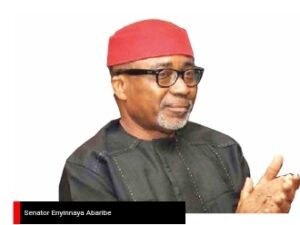Senate Decries Power Sector Privatisation, Labels it a Complete Failure
Senate Decries Power Sector Privatisation, Labels it a Complete Failure

The Nigerian Senate on Thursday condemned the privatisation of the power sector, calling it a complete failure due to the persistent lack of stable electricity supply across the nation, despite the initiative being implemented over a decade ago.
The lawmakers, during the review of a report from the Senate Committee on Power, suggested that they might propose legislative actions to reverse the privatisation policy, which they blamed for the ongoing power sector challenges.
The report, presented by the committee’s chairman, Senator Enyinnaya Abaribe (APGA, Abia South), focused on the recurring national grid collapses and other critical issues plaguing the sector. Abaribe pointed to several factors contributing to these failures, including aging infrastructure, neglected projects worth trillions of naira, regulatory inefficiencies, inadequate security, and the absence of modern monitoring systems like SCADA.
The committee also revealed that despite significant investments in power infrastructure, the national grid has experienced 105 collapses over the past decade. The costs associated with these failures, especially in restarting power plants, are substantial. According to the report, while running costs for plants like Azura, Delta, and Shiroro amount to $105,000, the cost of restarting these plants after a grid failure—referred to as a “black start”—can reach as much as $7 million per incident.
Collectively, grid failures in just three plants—Azura, Delta, and Shiroro—have cost Nigeria approximately ₦42.5 billion. The wider economic implications are even more severe when the costs of restarting other plants across the country are considered, although these figures are not fully quantifiable.
Abaribe highlighted that the National Grid, which is over 50 years old, is desperately in need of modernization to meet contemporary operational standards. He also pointed out that operational inefficiencies, abandoned projects, regulatory gaps, security concerns, and the lack of real-time monitoring capabilities were further exacerbating the crisis.
“The current state of the grid is a reflection of neglected maintenance and upgrades, making it increasingly susceptible to failures,” he said. “The cost of restarting plants following a grid collapse is a massive financial burden on the country, and this has far-reaching effects on the stability of the entire power sector.”
During the debate, Senator Adams Oshiomhole (APC, Edo North) criticized the privatisation policy, describing it as exploitative and financially burdensome for ordinary Nigerians. He stated that the electricity distribution companies (DisCos) were primarily focused on profit-making, often at the expense of service delivery. “The DisCos collect payments for services they do not render, leaving Nigerians with no recourse,” Oshiomhole remarked. “The privatised power sector has become a failure.”
Senator Abdul Ningi (PDP, Bauchi Central) added that the continued failure in the power sector was a result of the lack of accountability. He stressed that without sanctions for those responsible for the sector’s inefficiencies, the issues would persist. “Over the years, no one has been held accountable for the lapses in the sector. Mere reports without consequences will not lead to any meaningful change,” Ningi stated.
After further deliberations, the Senate decided to defer the report’s consideration, granting the Committee on Power an additional six weeks to conduct a more comprehensive investigation into the sector’s challenges. The committee is expected to report back with further recommendations for legislative action.
The call for an in-depth review of the power sector reflects growing concerns about the ongoing failures and the urgent need for reforms to ensure a stable and efficient power supply in Nigeria.
TRENDING SONGS
 NPMA Appeals to Nigerian Government for Compensation After Lagos Market Fire
NPMA Appeals to Nigerian Government for Compensation After Lagos Market Fire
 Rest Every Four Hours, FRSC Issues Safety Guide for Fasting Motorists
Rest Every Four Hours, FRSC Issues Safety Guide for Fasting Motorists
 NNPC Boss Ojulari Bags UK Energy Institute Fellowship
NNPC Boss Ojulari Bags UK Energy Institute Fellowship
 Shock in Anambra: Bride Disappears Moments Before Wedding
Shock in Anambra: Bride Disappears Moments Before Wedding
 Nigerian Woman Returns ₦330 Million Accidentally Credited to Her Account
Nigerian Woman Returns ₦330 Million Accidentally Credited to Her Account
 APC Don Reach Morocco?’ VeryDarkMan Reacts to Seyi Tinubu Poster
APC Don Reach Morocco?’ VeryDarkMan Reacts to Seyi Tinubu Poster
 Bride Breaks Down in Tears as Wedding Meals Were Kept Secretly While Guests Go Home Hungry
Bride Breaks Down in Tears as Wedding Meals Were Kept Secretly While Guests Go Home Hungry
 Odogwu by Day, Robber by Night: How Marriage Joy Turned Into Tragedy
Odogwu by Day, Robber by Night: How Marriage Joy Turned Into Tragedy
 Nigerian Officials Allegedly Pocket N4–6B Weekly Through Smuggling Cartels at Seme–Badagry Border
Nigerian Officials Allegedly Pocket N4–6B Weekly Through Smuggling Cartels at Seme–Badagry Border
 Ahmad Yerima: Naval Officer to Face No Sanctions After Clash with Wike – Matawalle
Ahmad Yerima: Naval Officer to Face No Sanctions After Clash with Wike – Matawalle
Share this post with your friends on ![]()













